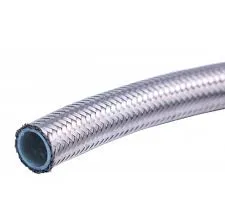Dec . 06, 2024 01:24 Back to list
CE Certification for SN Hose Manufacturers and Compliance Standards Explained
Understanding CE Certification for R1/R1SN Hose Manufacturers
In the world of industrial hose manufacturing, safety and compliance are paramount. One key aspect that ensures products meet the required safety and performance standards is the CE certification. This certification is particularly important for R1 and R1SN hoses, commonly used in various hydraulic applications. In this article, we will explore what CE certification entails, its significance for R1/R1SN hose manufacturers, and the benefits it provides.
What is CE Certification?
CE marking indicates a product's compliance with European health, safety, and environmental protection standards. The CE stands for Conformité Européenne, which translates to European Conformity. Obtaining this certification means that the manufacturer has taken the necessary steps to ensure their product meets all the relevant European directives. For hose manufacturers, particularly those producing R1 and R1SN hoses, CE certification plays a critical role in the marketability and reliability of their products.
R1 and R1SN Hoses An Overview
R1 and R1SN hoses are part of the hydraulic hose category, designed to handle high-pressure applications. R1 hoses are typically constructed from rubber and reinforced with one layer of high-tensile steel wire, whereas R1SN hoses are also rubber but have multiple steel wire braids for added strength. These hoses are widely used in various industries, including agriculture, construction, and manufacturing, where hydraulic systems are prevalent.
The Importance of CE Certification for Hose Manufacturers
1. Market Access In Europe, many industries require CE certification to sell products. For manufacturers of R1 and R1SN hoses, having the CE mark allows them access to European markets, expanding their customer base and increasing sales opportunities.
2. Consumer Trust The CE mark is recognized globally as a symbol of quality and safety. When a manufacturer can showcase CE certification, it builds trust with customers who can be assured that the products they purchase have met rigorous testing standards.
3. Legal Compliance In many countries, failing to meet regulatory requirements can lead to severe consequences, including fines, product recalls, or bans on sales. By obtaining CE certification, manufacturers ensure they are compliant with EU legislation, minimizing legal risks.
ce certification r1/1sn hose manufacturers

4. Competitive Advantage In a crowded market, having CE certification can distinguish a manufacturer from its competitors. It showcases a commitment to quality and safety, which can sway purchasing decisions in their favor.
The Certification Process
The process of obtaining CE certification for R1/R1SN hoses involves several steps. Manufacturers must first understand the relevant directives that apply to their products—such as the Pressure Equipment Directive (PED) and the Machinery Directive.
1. Product Assessment Manufacturers must conduct a thorough assessment of their hoses, including the materials used, construction techniques, and performance capabilities.
2. Testing Hoses must undergo testing by a recognized third-party organization. This includes performance tests to ensure they can withstand the pressures and temperatures they will face in real-world applications.
3. Technical Documentation Manufacturers must create a technical file that includes all documentation related to the design, production process, and testing results.
4. Issuance of Declaration of Conformity Once all criteria are met, manufacturers can issue a Declaration of Conformity, allowing them to affix the CE mark to their products.
Conclusion
CE certification is a crucial aspect for R1 and R1SN hose manufacturers looking to thrive in today's competitive market. It not only enhances product credibility but also ensures compliance with legal requirements and consumer safety. By understanding and navigating the certification process, manufacturers can position themselves successfully within the European market and contribute to the advancement of safe and effective hydraulic solutions. Embracing CE certification is not just an obligation; it's a strategic advantage that fosters trust and reliability in industrial applications.
-
Best Four Steel Wire Spiral Hose Hydraulic R12 – Durable High-Pressure Hose Manufacturer
NewsJul.08,2025
-
High-Quality 1/4 Hydraulic Hose – Soft, Flexible & Durable Rubber Hoses for Industrial Use
NewsJul.08,2025
-
1 1 2 Inch Hydraulic Flexible Hose - Durable, Reliable, High-Pressure Solutions
NewsJul.07,2025
-
High-Quality 1 2 Rubber Hose - Durable, Flexible Hydraulic Solutions
NewsJul.07,2025
-
Discover SAE Hydraulic Hose Types - High Quality & Durable Hoses from Leading Factory Supplier
NewsJul.06,2025
-
High Pressure Wire Hydraulic Rubber Hose Supplier Durable & Reliable 1SN Hose Solutions
NewsJul.06,2025
